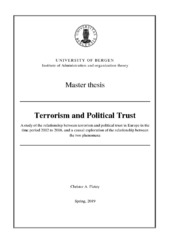Terrorism and Political Trust. A study of the relationship between terrorism and political trust in Europe in the time period 2002 to 2016, and a causal exploration of the relationship between the two phenomena
Master thesis
Permanent lenke
https://hdl.handle.net/1956/20607Utgivelsesdato
2019-07-16Metadata
Vis full innførselSamlinger
- Department of Government [457]
Sammendrag
This thesis explores the relationship between terrorism and political trust. This is done in two ways, by two sub-studies, in order to get a more comprehensive understanding of the relationship between the two phenomena. The first sub-study uses longitudinal multilevel regression to explore the historical empirical relationship between terrorism and political trust, in Europe for the time period 2002-2016, focusing specifically on the parliaments, the legal systems, the police, and the politicians. The second sub-study consists of a survey experiment specifically designed to explore the causal relationship between terrorism and political trust. Concretely, building on trust theories and rooted within an institutional framework, the paper suggests a theoretical framework that has a potential for explaining the causal relationship between terrorism and political trust. A central mechanism in this theoretical framework is individuals’ perception of institutions’ capacity to deal with terrorism. It is this mechanism, capacity perception, that is explored in the survey experiment. The results from the regressions shows that within-country variation over time has affected the political trust in Europe. The effect has, however, been somewhat limited. The effect has also varied between institutions, where the police have received increased trust, while the parliaments and politicians have had their trust reduced, and the legal systems seem unaffected. The results from the survey experiment shows that capacity perception is a causal mechanism in the relationship between terrorism and political trust, but that its’ influence and role varies depending on the institution at hand.
